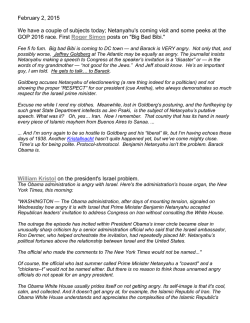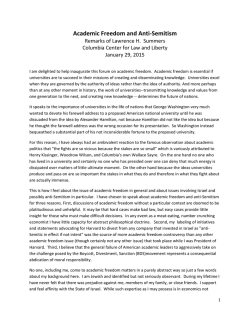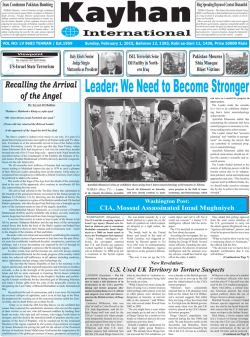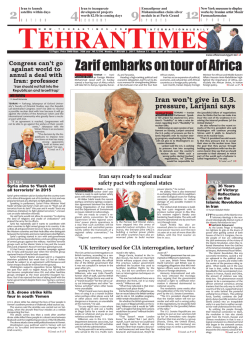
January 30 - S. Daniel Abraham Center for Peace
Israel and the Middle East News Update Friday, January 30 Headlines: • Nasrallah Confirms Hezbollah, Iran Bolstering Presence Along Golan Border • Hunt for Hezbollah Tunnels Goes on, Even as Border Tensions Fade • Lieberman Against Policy of Containment: “It Damages our Power of Deterrence” • PM: Issues Over US Speech Solvable, a Nuclear Iran Much More Difficult • Livni: Netanyahu Hurt Israel's Deterrence Capability • Israel Issues Tenders for New Settler Homes Ahead of Election • Senators Waiting on Palestinian Aid Pending Review of ICC Moves • Egypt's Sisi Cuts Short Ethiopia Visit after 30 Killed in Sinai Commentary: • Washington Post: “Five Reasons Netanyahu Should Not Address Congress” − By Robert Kagan • Forbes: “Why Netanyahu, the Churchill of Our Time, Must Speak Before Congress” − By Steve Forbes S. Daniel Abraham Center for Middle East Peace 633 Pennsylvania Ave. NW, 5th Floor, Washington, DC 20004 www.centerpeace.org ● Yoni Komorov, Editor ● Nathaniel Sobel, Associate Editor News Excerpts January 30, 2015 Jerusalem Post Nasrallah Confirms Hezbollah, Iran Bolstering Presence Along Golan Border Hezbollah on Friday confirmed Israeli suspicions that it was establishing a greater military presence near the Syrian-Israeli frontier on the Golan Heights. The Shi'ite group's leader, Hassan Nasrallah, gave a televised address in Lebanon in which he extolled the "fusion of Lebanese-Iranian blood on Syrian territory." Nasrallah's remarks reaffirmed the Hezbollah-Iranian effort to solidify another front in the struggle against its nemesis, Israel. The Hezbollah secretary-general's remarks were reported by the Beirut-based English language newspaper The Daily Star. The Israel-Lebanon frontier, where two Israeli soldiers and a Spanish peacekeeper were killed in an exchange of fire between Hezbollah and Israel, appeared quiet on Friday. New York Times Hunt for Hezbollah Tunnels Goes on, Even as Border Tensions Fade It is quiet most nights in this small, hilltop community in northern Israel on the border with Lebanon, and these days quite tense. So when residents began reporting strange sounds coming from underground recently, military engineers came running. On Thursday, they drilled deep into the ground by the perimeter fence of this village, checking for tunnels that the jittery residents suspect Hezbollah, the Lebanese militant group, was digging under their homes. It was the second day of the army’s drilling operation, which took on greater urgency after an attack on Wednesday by Hezbollah that killed two Israeli soldiers and wounded seven others. Ma’ariv Lieberman Against Policy of Containment: “It Damages our Power of Deterrence” Foreign Minister Avigdor Lieberman criticized the containment policy yesterday that Prime Minister Binyamin Netanyahu has adopted against Hizbullah following the incident two days ago on the Lebanese border. Lieberman wrote on his Facebook page, “Hizbullah is attempting to establish a forward base in the Golan Heights in order to operate from there as it does in southern Lebanon and to create a reality in which terror attacks against Israel can be conducted routinely as if it were part of the rules of the game. That is the practical significance of the decision not to respond in an aggressive manner against Hizbullah.” Jerusalem Post PM: Issues Over US Speech Solvable, a Nuclear Iran Much More Difficult Amid the controversy regarding his planned speech to the US Congress, Prime Minister Benjamin Netanyahu reiterated Friday during a visit to soldiers wounded in Wednesday’s attack that Israel is adamantly opposed to the agreement the world powers are negotiating with Iran. “It is possible to solve procedural problems related to my appearance in the United States,” he said, “but if Iran obtains nuclear arms that is something that will be a lot more difficult to solve, and that is what we are opposed to and are focusing on.” Netanyahu is expected to use his speech to the Joint Session of the US Congress scheduled for March 3 to argue against the agreement, and for stronger sanctions – a position placing him at odds with US President Barack Obama. 2 Ha’aretz Livni: Netanyahu Hurt Israel's Deterrence Capability After a tense night on the northern front following Hezbollah's deadly attack on an IDF convoy, Zionist Camp's deputy chief Tzipi Livni criticized Prime Minister Benjamin Netanyahu on Thursday for hurting Israel's international standing by alienating the Arab world. "Netanyahu has hurt Israel's deterrence capability," she told Ynet. "I asked to recruit the world to the cause and to send a message to the moderate Arab world – the one that does not want Hezbollah to rear its head – to join the coalition against the Islamists. The option was available during Operation Protective Edge as well, but Netanyahu hesitated, stuttered, and spurned the opportunity to end the mission in a way that the whole world would agree to demilitarize Gaza," Livni said during a Ynet panel discussion. Reuters Israel Issues Tenders for New Settler Homes Ahead of Election Israel published tenders on Friday for the construction of 450 new housing units in occupied Palestinian territory, a move that critics denounced as a political gesture ahead of a March general election. Ariel Rosenberg, spokesman for Israel's Housing Ministry, said the government was simply remarketing tenders that had failed to sell when they were initially offered last year. Israel goes to the polls on March 17, with Prime Minister Netanyahu seeking a fourth term in office. A number of groups, including Netanyahu's own Likud party, are battling to secure pro-settler votes at the ballot. See also, “Michael Oren criticizes tenders issued for West Bank settlement units” (Ha’aretz) JTA Senators Waiting on Palestinian Aid Pending Review of ICC Moves Three in four U.S. senators pledged not to support assistance to the Palestinian Authority until the Obama administration reviews the admittance of Palestine to the International Criminal Court. “Current law prohibits economic assistance to the Palestinian Authority if the Palestinians initiate an ICC investigation of Israeli nationals or ‘actively support such an investigation,’” said the letter sent Thursday by 75 senators to Secretary of State John Kerry. “Although we believe it is in the interest of the United States for urgent humanitarian assistance to continue to be provided to the Palestinian people, we will not support assistance to the Palestinian Authority while you undertake a review of this matter,” it said. Reuters Egypt's Sisi Cuts Short Ethiopia Visit after 30 Killed in Sinai Egyptian President Abdel Fattah al-Sisi cut short a visit to Ethiopia for an African Union summit on Friday, after Islamic State's Egyptian wing claimed the killing of at least 30 security personnel in the Sinai Peninsula. Sisi's office said in a statement that Sisi would return to Cairo after Friday morning's opening session. The four separate attacks on security forces in North Sinai on Thursday night were among the bloodiest in years. Most of the casualties occurred in the bombing of a military hotel and base in the heavily guarded provincial capital, al-Arish. Security sources in Sinai said three military planes left al-Arish for Cairo on Friday morning carrying 30 body bags, some of them containing corpses in pieces from the bomb attacks. They said at least five men were in critical condition and the death toll was likely to rise. 3 Washington Post – January 29, 2015 Five Reasons Netanyahu Should Not Address Congress By Robert Kagan • Here are five reasons Israeli Prime Minister Benjamin Netanyahu should politely decline House Speaker John Boehner’s invitation to address a joint session of Congress: • ● It’s inappropriate. It doesn’t matter what good allies the United States and Israel are, and it doesn’t matter how bad relations may be between Netanyahu and President Obama. Allies don’t go big-footing around in each other’s politics. It also doesn’t matter how worthy the cause. In 1793, when Citizen Genêt traveled through the United States, drumming up support for revolutionary France (and overtly violating President George Washington’s policy of U.S. neutrality), he no doubt thought it was a worthy cause — and so did the many Americans, including numerous Jeffersonian Republicans and Washington opponents, who welcomed him with open arms. But it was an unacceptable intrusion into the U.S. political system. Thomas Jefferson himself, then secretary of state, took Washington’s side. • ● It will damage Israel’s image in the United States. Israel enjoys a great deal of sympathy among Americans, but there is such a thing as overplaying a hand. Even among those who may be enjoying the spectacle of Obama being defied (and, by the way, patriotic Americans should not be enjoying that spectacle, no matter how they feel about Obama), when all is said and done, Netanyahu’s visit may leave a sour taste. Genêt’s visit ultimately did more to discredit than help France in the eyes of many Americans, even some who had otherwise been sympathetic or neutral toward the revolution. • ● It is not good for the American debate over Iran. At the end of the day, that debate has to rest on a consideration of U.S. interests, not those of Israel. The two sets of interests may be congruent in some instances, but they are never identical, because no two nations’ interests are ever identical. Israel conducts business with other countries that does not always serve U.S. foreign policy objectives. That is its prerogative. The United States is used to taking into account broader interests than its own, including those of its allies. Nevertheless, it, too, needs to make decisions based on its own calculations. Giving the Israeli prime minister the forum of a joint session to make Israel’s case on the Iran question might or might not be a good idea at a time of consensus between Congress and the president. Given that the United States is carrying out a vigorous and healthy debate over what to do about Iran, the intrusion of the Israeli prime minister only muddies the waters. • ● It is not good for Congress. Congress already suffers from an image of excessive deference to Israel on matters of foreign policy. But Israel has no monopoly on strategic wisdom. It makes mistakes just as the United States does and all nations do. On issues such as Egypt and the broader question of supporting dictators in the Middle East, for instance, Israel always, and mistakenly, urges Congress and the administration to support autocrats who see that part of the world the way Israel does. In the case of Iran, Israel is uniquely threatened and, as a U.S. ally, it deserves a serious and appropriate hearing here. But it is a mistake for Congress to treat Israel as if it were fundamentally different from all other U.S. allies, some of whom also face dire threats. 4 • ● It fails the Churchill test. There was no greater friend of the United States than Winston Churchill and no better ally of the United States than Britain. Between 1939 and 1941, Churchill was desperate for deeper U.S. involvement in Britain’s life-and-death struggle with Nazi Germany. The British faced at least as dire a threat then as Israel faces today — arguably more dire. No one was inviting Churchill to speak to a joint session of Congress, of course, but would Churchill even have considered accepting such an invitation without the approval of President Franklin Roosevelt? When Churchill gave his famous “Iron Curtain” speech in Fulton, Mo., in 1946, he did so as a private citizen — and, as it happened, he was escorted to the speech by President Harry Truman. • U.S. congressional leaders probably should have given this invitation more thought. Although not a violation of the letter of the Constitution, it certainly seems to violate the idea that the nation speaks with one voice on foreign policy and that foreign leaders cannot choose whether they prefer to deal with Congress or the president. Will Republicans be happy when the shoe is on the other foot, and a Democratic Congress invites foreign leaders to joint sessions in defiance of a Republican president’s wishes? • But whether the congressional leadership has thought this through or not, there is still time for the Israeli prime minister to do the right thing — and decline. Robert Kagan is a senior fellow at the Brookings Institution. He writes a monthly foreign affairs column for The Post. 5 Forbes – January 29, 2015 Why Netanyahu, the Churchill of Our Time, Must Speak Before Congress By Steve Forbes • It is fitting and proper–indeed essential for our very security–that Speaker John Boehner has extended an invitation to Israeli Prime Minister Benjamin “Bibi” Netanyahu to address Congress on Iran and its efforts to develop nuclear weapons and the missiles to deliver them anywhere in the world. The invitation has bipartisan support because many members on both sides of the aisle recognize the fundamental threat to world peace that a nuclear-armed Iran would pose. Like Winston Churchill in the 1930s with Nazi Germany, Netanyahu has been sounding the alarm about Iran’s ominous nuclear and terrorist activities. • It’s a message much of Europe and even segments of the US, particularly in the Obama administration, don’t want to hear. The President has made clear his intense dislike of Israel’s prime minister and his refusal to keep quiet about Obama’s desire to conclude a Neville Chamberlain-like deal with Teheran. In a flagrant interference in another country’s election, Obama operatives are working hard in Israel to help bring down the courageous Prime Minister. • Congress needs to hear first-hand the truth about what Iran is doing and the dreadful implications of those activities. • Thanks to US leadership, the ever-harder sanctions imposed over the years had taken a politically damaging toll on the Iranian economy. The mullahs agreed to sit down with the US and Britain, France, Russia, China and Germany to come up with an agreement ostensibly to get Iran to back off its nuclear ambitions. Iran’s agenda was simple: get the sanctions eased, and then with a loophole-ridden treaty, get them removed altogether. • The basic problem is that the Obama administration wants a deal–any deal–with Teheran and the other parties to the talks are willing to go along in order to snag business contracts with Iran, oblivious to the implications of a radical regime that will be in the position to get the Bomb any time it wants. • Appeasers argue that containment will work with a nuclear-armed Iran just as it did with the old Soviet Union during the Cold War and thus there is nothing to really worry about. Israel and other Mideast nations know better. • The Iranian government, despite the immense corruption of many of its leaders, is a revolutionary regime. Its actions over the years demonstrate that the rhetoric of its officials is more than just hot air. Iran is terror central. It bankrolls and provides arms to Hamas, Hezbollah and all sorts of Islamic terrorists organizations. If the US tacitly concedes its resignation to Iran becoming a nuclear power, then other countries will follow suite in creating their own nukes, including Turkey, Saudi Arabia and Egypt. • That kind of proliferation enormously increases the chances of a nuclear war. We saw in 1914 how the then-center of civilization plunged into a catastrophic war. Even during the Cold War, Washington and Moscow went to the brink of a nuclear holocaust during the Cuban Missile Crisis. (President John Kennedy was acutely aware during those fraught days of how events in 6 1914 ran away from European leaders.) With nukes in so many unstable hands, a disaster is almost a certainty. Moreover, the widespread knowledge of how to make the Bomb will certainly fall into terrorist hands, which is why the US must prevent this nuclear proliferation in the first place. • Ominously Iran has apparently developed an intercontinental ballistic missile that can reach not only Israel but also Europe. It won’t be many years before the mullahs can aim nuclear tipped missiles against the US. No surprise, the current negotiations don’t cover Iranian missile development. • Another factor Obama and his appeasement-minded minions willfully ignore is the existential threat Iran poses to Israel. Given the size of the Jewish state, it has no room for error. A nuclear-armed Iran will put Israeli leaders in a dangerous, hair-trigger situation. Israel is a crucial US ally, strategically and morally. It is the only durable democracy in the Mideast. With only 8 million people, Israel has surpassed the European Union, with a population of over 400 million, in high technology, rivaling Silicon Valley. It was born from the ashes of the Holocaust. The destruction of Israel would mean, ultimately, the end of Western civilization; the moral rot that would permit such an event would be just about impossible to surmount. • It is not only Israel that is appalled by what Iran is up to. When Israel very nearly undertook preemptive action against Teheran in 2012, countries such as Saudi Arabia were remarkably open about their support for Israeli military actions that would destroy or cripple Iran’s nuclear facilities. • President Obama is either oblivious to all this or feels that in his perverted worldview, these things don’t much matter. Iran knows Obama desperately wants an agreement. It figures that the more it refuses to accept Obama’s willingness to surrender, the more concessions he will offer. • And spin to the contrary, an agreement will be a surrender. For all intents and purposes, Iran will be allowed to make a nuclear device any time it wishes. Obama and Secretary of State John Kerry will proclaim that if Teheran goes to make the Bomb, the US will have plenty of time to stop them before the Iranians can actually do it. Nonsense. It is has already crossed a very difficult threshold on uranium enrichment. The mullahs are moving ahead on the plutonium front. Teheran has brazenly blocked the International Atomic Energy Agency from access to its nuclear installations. • Congress is considering legislation proposed by Sen. Robert Menendez (D., NJ) and Sen. Mark Kirk (R., Ill.) that would impose stiff sanctions on Iran if an agreement is not reached by the deadline of June 30. Twice before, negotiation deadlines have been extended. This would effectively tell Iran, put up or shut up. Obama is naturally opposed. He wants nothing that might jeopardize his dangerous course of abject appeasement of an evil regime. The President outrageously dragooned British Prime Minister to play the role of unregistered lobbyist to call Senators to block the Menendez-Kirk bill. • Which gets to why Speaker John Boehner was well within his bounds to extend that invitation to Netanyahu. Such a momentous treaty with Iran as desired by Obama must, under the Constitution, be submitted to the US Senate for ratification. Obama has trampled on the Constitution time and again–making laws and changing laws at will–and wants no 7 Congressional involvement precisely because the resultant debate would glaringly show what a dangerously miserable deal he had cut. The ranking Democrat on the Senate Foreign Relations Committee, Robert Menendez, recently declared: “The more I hear from the Administration and its quotes, the more it sounds like talking points that come straight out of Teheran.” When President Obama declared in his State of the Union Address that Iran has “halted the progress of its nuclear program and reduced its stockpile of nuclear material,” the guffaws could be loudly heard from every intelligence agency in the world. • Congress is a separate branch of government. Hearing directly from Netanyahu is well within its prerogatives, especially on a matter as critical as this. By the way back in 2011, Speaker Boehner attempted to coordinate a Netanyahu invitation with the White House. Naturally Obama gave Boehner the back of his hand by ignoring this courtesy. Steve Forbes is Chairman and Editor-in-Chief of Forbes Media. 8
© Copyright 2026





